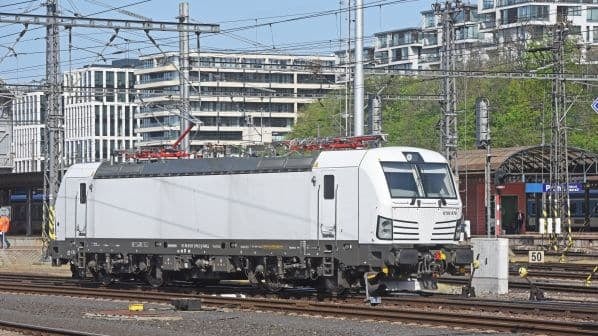CZECH Railways (ČD) has agreed a deal with Škoda Group for the supply of 15 dual-mode battery-electric multiple units (BEMU) for operation in the Moravian-Silesian region in the east of the Czech Republic.
The contract with Škoda is worth Koruna 3.5bn ($US 151.9m). It includes supply of the new trains and staff training, as well as maintenance and supply of spare parts for 15 years. This element accounts for around a quarter of the total value of the contract.
The two-car trains, which are based on Škoda’s RegioPanter platform, will be equipped to take traction current at both 3kV dc and 25kV ac and will operate at a maximum speed of 160km/h. The trains will have a top speed of 120km/h in battery mode and an output of 10.9kW/t, with a range of up to 80km. Three battery packs will be installed on the roof of the single-deck train and recharging will take place while the train is operating in electric mode as well as through regenerative braking.
The new trains will enable ČD to offer direct services from Ostrava to towns and cities beyond the electrified network in the Moravian-Silesian region, such as Krnov, Nový Jičín or Budišov nad Budišovou. They will be deployed on the following lines:
- Ostrava - Opava - Krnov
- Ostrava - Suchdol nad Odrou - Nový Jičín
- Ostrava - Budišov nad Budišovka (weekends)
- Ostrava - Český Těšín - Frýdek-Místek, and
- Ostrava - Český Těšín - Frýdek-Místek - Ostrava, following the completion of a project to rebuild Line 323.
Under the terms of the contract, at least seven of the trains from the order must be supplied no later than November 2026, enabling ČD to deploy the trains at the timetable change the following December under a new operating contract with the region.
The trains will have capacity for 150 seated passengers, including eight in first class. They will be equipped with ETCS and GSM-R.
Škoda offered prospective passengers a preview of its first BEMU during the Czech Rail Days event held in Ostrava this week. ČD ordered an initial four two-car trains from Škoda in 2022 and has confirmed that these trains will enter service on the Ostrava - Studénka - Veřovice line this December. Passengers will no longer have to change trains at Studénka.
“Deploying dual-power trains reduces carbon emissions when operating on non-electrified lines and makes it possible to offer citizens more direct connections that combine travel on main electrified lines and secondary lines without electrification,” says Mr Michal Krapinec, chairman of the board and CEO of ČD.
For detailed data on battery fleet orders from around the world, subscribe to IRJ Pro.




